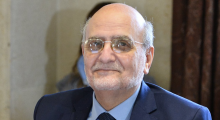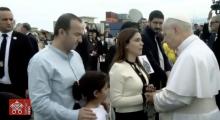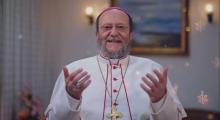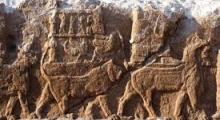Issued by the Catholic Center for Studies and Media - Jordan. Editor-in-chief Fr. Rif'at Bader - موقع أبونا abouna.org

On the 60th anniversary of Nostra Aetate—the Second Vatican Council’s declaration on the relation of the Church to non-Christian religions—Bishop Paolo Martinelli, Apostolic Vicar of Southern Arabia, reflected on the continuing relevance and evolution of interreligious dialogue.
Speaking to AVOSA website, the Bishop described dialogue as an essential part of daily Christian life, especially within the multicultural reality of the Gulf region.
A new perspective rooted in Revelation
Bishop Paolo highlighted that Nostra Aetate introduced “a genuinely new perspective for the Church” when it was first issued, even though its roots go back to Scripture. This vision, he said, is seen in “Jesus Christ’s capacity to be in contact with all people, also outside Israel. Furthermore, we can trace this vision in the Old Testament, particularly in Isaiah’s prophecies about all peoples gathered in Jerusalem.”
“The roots of Nostra Aetate are in Revelation,” he affirmed. “That makes this anniversary particularly important for the Universal Church and for our Church in the Gulf.”
A living laboratory
In the Gulf, marked by migration and diversity, people of different faiths live side by side every day. This, the Bishop said, makes the region “a laboratory of coexistence.” Although the area is predominantly Islamic, “the founding spirit of the host country has been one of great openness, welcoming diverse peoples and religions.” That’s why the message of Nostra Aetate is “particularly relevant” to this lived experience.
Recalling a reflection from Pope Benedict (when he was still a professor), Bishop Paolo stressed that interreligious dialogue is “a matter of our daily life. It’s an internal question of our faith.”
Recognizing the good and valuing differences
A core principle of Nostra Aetate, Bishop Paolo explained, is recognizing “what is good in other religions,” as “a sign that the Holy Spirit is acting also in those realities.” This understanding “rejects exclusivism and attitudes like indifference or proselytism, while giving value to the differences!” Such an approach enables Christians “to work together with people of other religions, recognizing a shared divine call to collaboration.”
The leap to human fraternity
The path opened by Nostra Aetate reached a new milestone with the Document on Human Fraternity, signed by Pope Francis and the Grand Imam of Al-Azhar. Bishop Paolo called it “a prophetic document” that moves dialogue beyond doctrinal exchange toward “the concept of human fraternity, meaning religions are called to work together for a more fraternal world.”
In this light, interreligious dialogue becomes a “fundamental dimension of humanization,” where “human beings achieve their full humanity through diverse religious traditions.” When religions work together, he added, “they underscore the importance of God in society. When religions are divided, the idea of God suffers and is pushed out of public discourse, for fear of conflict. Humanity without God lacks ultimate meaning and destiny,” he said, stressing the vital connection between God and the human experience.
“We share the same questions about the world and ourselves, about the meaning of life,” he continued. “Maybe we can listen to each other, appreciate one another, walk and work together.”
Forming the faithful for dialogue
Recognizing the daily need for dialogue, Bishop Paolo established the Interfaith and Ecumenical Dialogue Office (IFEDO) soon after his arrival. Its goal, he said, is to help the faithful “live their faith connected with people from different faiths.”
He emphasized that good relations between religious leaders are not enough. “We must train people so they can live their Christian faith positively while in contact with neighbors, colleagues, and schoolmates of other faiths. Christian formation must help them to think of their faith through constant connection and dialogue.”
A new awareness is gradually emerging among the faithful. The Abrahamic Family House in Abu Dhabi, he noted, has been “a great positive provocation,” offering a tangible image of connection among the three monotheistic religions. The Document on Human Fraternity, which inspired this project, is being studied in the Vicariate, and catechists are specifically trained on it.
According to the Bishop, the heart of true dialogue is witnessing. “Dialogue is not a neutral process of hiding one’s identity; rather, it requires self-exposure—being able to articulate one’s traditions and how they can benefit society.” He compared this to the encounter between Saint Francis of Assisi and the Sultan in Damietta, where the encounter ultimately fostered understanding and respect.
Strategic partnerships and global encounters
To strengthen formation, the Vicariate has invested in academic and spiritual training connected to real-life experience. The Vicariate aims to train people with academic experience and a thorough knowledge of other religions to reflect on and promote dialogue.
Bishop Paolo expressed gratitude for the collaboration with the Pontifical University Antonianum, where he has long been involved. A new joint program with IFEDO focuses on interreligious dialogue from a spiritual perspective, exploring how faith is lived in practice. A collaboration between IFEDO and the Theological University of Southern Italy was also established.
Recently appointed by Pope Leo as a member of the Dicastery for Interreligious Dialogue, Bishop Paolo mentioned recent meetings with Archbishop Nicolas Lhernould of Tunis, and Imam Abdulgafar ef. Velić of Sarajevo, as valuable exchanges to understand dialogue in different contexts, especially between Christians and Muslims.
On the occasion of Deepavali, Bishop Paolo sent greetings to the Hindu community in the UAE, writing: “May we continue walking together on the path of mutual understanding, fraternity, and harmony, renewing our shared commitment to be artisans of peace in our world.”
Looking ahead
As the Vicariate marks the anniversary of Nostra Aetate, IFEDO is preparing new formation paths for catechists and youth, ensuring that the values of dialogue and fraternity become an integral part of Christian education for the next generation.







